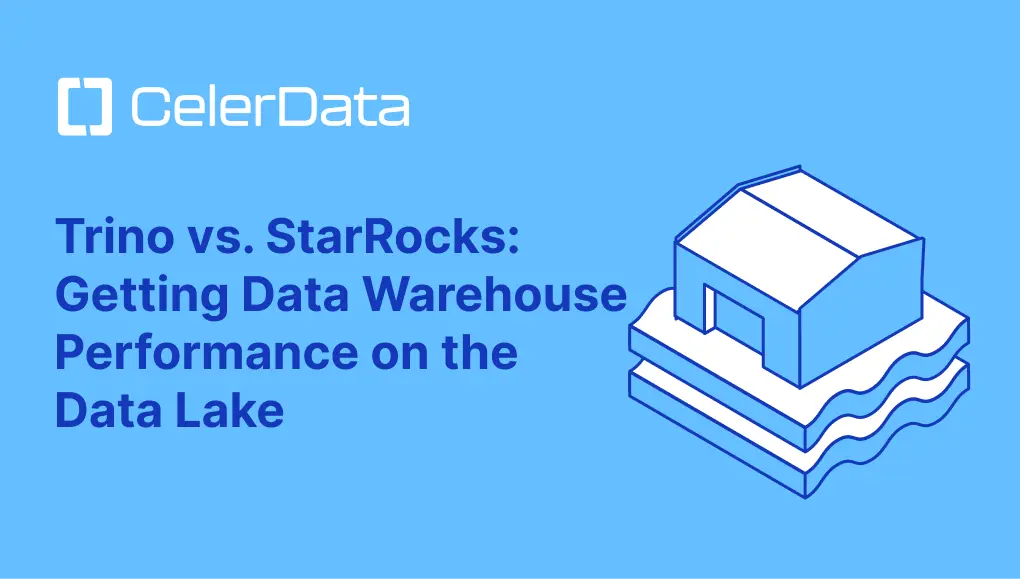
Couchbase

Join StarRocks Community on Slack
Connect on SlackWhat is Couchbase?
Couchbase emerged from the merger of two significant projects: Membase and CouchOne. The founders of these projects combined their expertise to create Couchbase, Inc. This merger led to the release of Couchbase Server 1.8, marking the beginning of a new era in NoSQL databases.
Key Milestones
Couchbase has achieved several key milestones since its inception. The release of Couchbase Server 2.0 introduced a new JSON document store, indexing and querying capabilities, incremental MapReduce, and replication across data centers. These enhancements significantly improved the database's performance and scalability. Over the years, Couchbase continued to innovate, adding features like full-text search and advanced analytics to meet the evolving needs of modern applications.
Core Features
Document Store
Couchbase provides a robust document store that uses JSON documents. This feature allows developers to store and manage data in a flexible, schema-less format. JSON documents enable easy data manipulation and support complex data structures, making Couchbase an ideal choice for dynamic applications.
Key-Value Store
Couchbase also functions as a high-performance key-value store. This capability ensures low-latency access to data, which is crucial for real-time applications. The key-value store supports efficient data retrieval and storage, enhancing the overall performance of the database.
Full-Text Search
Couchbase includes full-text search functionality, allowing users to perform complex searches on their data. This feature supports various search operations, including text analysis, tokenization, and indexing. Full-text search enables users to quickly find relevant information within large datasets.
Analytics
Couchbase offers advanced analytics capabilities to help users gain insights from their data. The analytics engine supports SQL-like queries, enabling users to perform complex data analysis without needing specialized skills. This feature allows organizations to make data-driven decisions and optimize their operations.
Installation and Setup
System Requirements
Hardware Requirements
Couchbase requires specific hardware to ensure optimal performance. A minimum of 4 CPU cores and 8 GB of RAM is recommended for development environments. For production environments, at least 8 CPU cores and 16 GB of RAM are necessary. Adequate disk space is also essential. SSDs are preferred due to their high read/write speeds.
Software Requirements
Couchbase supports various operating systems. These include Windows, macOS, and Linux. Ensure that the system has a 64-bit operating system. Additionally, Couchbase requires certain software dependencies. These include libc, OpenSSL, and Python. Verify that these dependencies are installed before proceeding with the installation.
Installation Steps
Installing on Windows
-
Download the Couchbase Server installer from the official website.
-
Run the installer and follow the on-screen instructions.
-
Choose the installation directory and click "Next."
-
Select the components to install and click "Install."
-
Once the installation completes, open the Couchbase Web Console to verify the installation.
Installing on macOS
-
Download the Couchbase Server DMG file from the official website.
-
Open the DMG file and drag the Couchbase Server icon to the Applications folder.
-
Open the Terminal and navigate to the Applications directory.
-
Run the command
sudo ./Couchbase\ Server.app/Contents/MacOS/Couchbase\ Server --install. -
Open the Couchbase Web Console to confirm the installation.
Installing on Linux
-
Download the Couchbase Server package for your Linux distribution from the official website.
-
Open the Terminal and navigate to the download directory.
-
Run the command
sudo dpkg -i couchbase-server-enterprise_x.x.x-ubuntuXX.x_amd64.debfor Debian-based systems orsudo rpm -ivh couchbase-server-enterprise-x.x.x-centos7.x86_64.rpmfor Red Hat-based systems. -
Start the Couchbase service using
sudo systemctl start couchbase-server. -
Access the Couchbase Web Console to verify the installation.
Initial Configuration
Setting Up a Cluster
After installing Couchbase, the next step involves setting up a cluster. Open the Couchbase Web Console and log in with the default credentials. Click on "Setup New Cluster." Enter a name for the cluster and set the administrator password. Click "Next" to proceed. Configure the memory quotas for data, index, and search services. Click "Next" to complete the setup.
Configuring Nodes
To add nodes to the cluster, navigate to the "Servers" tab in the Couchbase Web Console. Click on "Add Server." Enter the IP address of the new node and the administrator credentials. Click "Add Server" to include the node in the cluster. Repeat this process for additional nodes. Ensure that each node meets the hardware and software requirements.
Comparisons with Other Databases
Couchbase vs. MongoDB
Performance
Couchbase excels in performance due to its built-in memory caching and efficient data handling. The database supports high load reads and writes, making it suitable for applications requiring low latency. MongoDB also performs well but lacks the same level of built-in caching. MongoDB uses a different approach to data storage and retrieval, which can result in slower performance under heavy loads.
Scalability
Couchbase offers robust scalability features, allowing seamless scale-up and scale-down operations. The database supports horizontal scaling, enabling the addition of nodes to handle increased workloads. MongoDB also supports horizontal scaling but may require more complex configurations to achieve optimal performance. Couchbase's architecture simplifies the scaling process, making it more user-friendly.
Use Cases
Couchbase is ideal for high-performance cache use cases, real-time applications, and scenarios requiring rapid data access. The database's flexibility and speed make it suitable for e-commerce, social media, and mobile applications. MongoDB is often used for content management systems, big data applications, and scenarios requiring flexible schema design. Both databases serve different purposes depending on the specific needs of the application.
Couchbase vs. Cassandra
Performance
Couchbase provides superior performance through its memory caching and efficient data replication mechanisms. The database ensures low-latency access to data, which is crucial for real-time applications. Cassandra also offers strong performance but focuses more on write-heavy workloads. Cassandra's architecture supports high write throughput but may experience higher read latencies compared to Couchbase.
Scalability
Couchbase supports easy scalability with its distributed architecture. The database allows for the addition of nodes without significant reconfiguration. Cassandra also excels in scalability, particularly for write-heavy applications. Cassandra's peer-to-peer architecture enables linear scalability, but Couchbase offers a more straightforward scaling process for mixed read-write workloads.
Use Cases
Couchbase is recommended for applications requiring high-performance caching, real-time data access, and flexible data modeling. The database is suitable for e-commerce platforms, social media networks, and mobile applications. Cassandra is often used for applications needing high write throughput, such as logging systems, time-series data, and large-scale data warehouses. Both databases have unique strengths, making them suitable for different types of applications.
Use Cases and Applications
Real-Time Applications
E-commerce
E-commerce platforms require high performance and scalability to handle large volumes of transactions. Couchbase provides a robust solution for these needs. The database supports real-time inventory management, ensuring that stock levels remain accurate. This capability prevents overselling and enhances customer satisfaction. Couchbase's built-in caching reduces latency, allowing for quick retrieval of product information. This feature improves the user experience by providing fast page loads and search results.
Social Media
Social media applications demand low-latency data access and high throughput. Couchbase excels in these areas, making it an ideal choice for social media platforms. The database handles user profiles, posts, comments, and likes efficiently. Couchbase's full-text search enables users to find relevant content quickly. The database also supports real-time notifications, ensuring that users receive updates promptly. These features enhance user engagement and retention.
Offline-First Applications
Mobile Apps
Mobile applications often need to function without a constant internet connection. Couchbase supports offline-first capabilities, making it suitable for mobile apps. The database allows data to be stored locally on the device. When the device reconnects to the internet, Couchbase synchronizes the local data with the server. This feature ensures that users can continue to use the app without interruption. Couchbase's flexible data model supports various data structures, making it easier to manage complex mobile applications.
IoT Devices
Internet of Things (IoT) devices generate large amounts of data that need to be processed in real-time. Couchbase provides a scalable solution for managing this data. The database supports edge computing, allowing data to be processed closer to the source. This capability reduces latency and improves performance. Couchbase's efficient data replication ensures that data remains consistent across multiple devices. This feature is crucial for maintaining the reliability of IoT applications.
Architectural Details
Data Model
JSON Documents
Couchbase utilizes JSON documents as a core component of its data model. JSON documents provide flexibility by allowing developers to store data in a schema-less format. This structure supports complex and nested data, making it suitable for dynamic applications. JSON documents enable easy data manipulation, which enhances the efficiency of data management tasks.
Key-Value Pairs
Couchbase also supports key-value pairs, which offer a straightforward method for data storage and retrieval. Key-value pairs ensure low-latency access to data, crucial for real-time applications. This model allows for efficient indexing and quick lookups, contributing to the overall performance of the database.
Query Engine
N1QL Query Language
The N1QL query language in Couchbase combines the familiarity of SQL with the flexibility of JSON. N1QL enables developers to perform complex queries on JSON documents using a syntax similar to SQL. This feature reduces the learning curve for those accustomed to relational databases. N1QL supports various operations, including joins, filtering, and aggregations, providing robust querying capabilities.
Indexing
Couchbase offers advanced indexing options to enhance query performance. The database supports multiple types of indexes, such as primary, secondary, and full-text indexes. Indexing allows for efficient data retrieval by organizing data in a way that optimizes search operations. Proper indexing can significantly reduce query execution times, improving the responsiveness of applications.
Scalability and Performance
Horizontal Scaling
Couchbase excels in horizontal scaling, which involves adding more nodes to a cluster to handle increased workloads. This capability ensures that the database can grow seamlessly with the application's demands. Horizontal scaling allows for distributing data across multiple nodes, balancing the load, and maintaining high performance. Couchbase's architecture simplifies the scaling process, making it user-friendly and efficient.
Data Replication
Couchbase employs data replication to ensure high availability and disaster recovery. The database replicates data across multiple nodes, providing redundancy and fault tolerance. Data replication enhances the reliability of the system by ensuring that data remains accessible even if some nodes fail. This feature is crucial for maintaining data integrity and continuity in mission-critical applications.
Couchbase stands out as a powerful NoSQL database due to its robust architectural features. The combination of a flexible data model, advanced query engine, and exceptional scalability and performance makes Couchbase an ideal choice for modern applications.
Conclusion
Couchbase offers several key features and benefits. These include high performance, memory caching, and flexible data modeling. Couchbase supports a variety of use cases while performing and scaling well. Users appreciate Couchbase's strong performance, specifically highlighting its memory caching as a significant advantage over other NoSQL databases.
Couchbase holds significant importance in modern applications. The database excels in handling high load reads and writes. Couchbase provides robust solutions for real-time and offline-first applications. Couchbase's architecture ensures seamless scalability and reliability.
Explore Couchbase further to leverage its capabilities. Couchbase stands out as a powerful choice for enterprises looking to optimize their data management strategies.



.jpg)